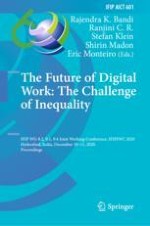2020 | Buch
The Future of Digital Work: The Challenge of Inequality
IFIP WG 8.2, 9.1, 9.4 Joint Working Conference, IFIPJWC 2020, Hyderabad, India, December 10–11, 2020, Proceedings
herausgegeben von: Prof. Rajendra K. Bandi, Ranjini C. R., Prof. Dr. Stefan Klein, Prof. Shirin Madon, Prof. Eric Monteiro
Verlag: Springer International Publishing
Buchreihe : IFIP International Federation for Information Processing
